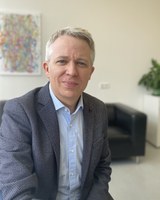Undiscovered compounds, bee navigation
Freiburg, Mar 31, 2021
The Volkswagen Foundation is funding the work of chemist Professor Henning Jessen and of biologist Professor Andrew Straw under its “Momentum” funding initiative, with each research team receiving almost one million euros over five years. Jessen’s award is for research into phosphorylated metabolites - metabolites with attached phosphate groups that play an essential role in many vital processes. The aim is to find previously unknown compounds in this class of substances and to describe their functions. Andrew Straw will use the funding to develop a high-resolution computer-based system that can track the flight behavior of bees in their natural environment.
Henning Jessen: The search for unknown compounds
We know of many examples of the phosphorylated metabolites substance class. Phosphoric acid esters, for example, are components of genetic material as well as of inositol pyrophosphates, which as messenger chemicals monitor the energy balance of the cell. Phosphoric anhydrides are found, among other things, in adenosine triphosphate (ATP), the general energy “currency” in cells. In bacteria, “magic spot” nucleotides, which also contain phosphoric esters and phosphoric anhydrides, regulate many metabolic processes and are instrumental in circumventing the effectiveness of antibiotics. All these compounds exhibit a significantly negative charge on the molecules and are often also highly unstable.
“The discovery, isolation, description and application of naturally-occurring substances is a highly topical field. However, research in this field focuses almost exclusively on the discovery of new molecules that are not very polar and less unstable,” Jessen explains. But, working with his team, he has already obtained numerous indications of previously unknown polar and unstable compounds during sample analysis. Now he wants to follow up on those compounds. Using special extraction methods as well as mild analytics, the working group will attempt to enrich and isolate these metabolites and describe their function.
Henning Jessen has been Professor of Bioorganic Chemistry at the Institute of Organic Chemistry at the University of Freiburg since 2015. He is a member of the Clusters of Excellence CIBSS - Centre for Integrative Biological Signalling Studies and livMatS - Living, Adaptive and Energy-autonomous Materials Systems. His research plan, which is now being funded via Momentum, is closely linked to CIBSS research and is part of the potential field of metabolism research at the University of Freiburg. For his research on bacterial stress messenger chemicals, he received a Consolidator Grant from the European Research Council (ERC) in 2019.
Andrew Straw: How bees navigate their environment
Currently, there is no technology that allows researchers to observe insects in their natural environment with sufficiently high-resolution images. Laboratory studies have shown that in species such as bees, wasps and ants, the visual appearance of landmarks is important for memory-based navigation. Field studies have also shown that bees learn routes and visit the same flowers repeatedly, improving their memory over time. However, new technologies are needed to explore what such results mean for the animals' behavior in their real-world environment.
The goal is therefore to develop a computer-based bee tracking system for outdoor use and take it into the natural environment, explains Andrew Straw. “This system should be able to track bees in their natural habitat with millimeter and millisecond resolution over tens, hundreds and perhaps thousands of meters,” he says. He also plans to develop an exhibit that will educate children and adults about live bee tracking by showing trajectories and a simulation of the visual experience of flying bees, as well as other things.
Andrew Straw has been Professor of Behavioral Neuroscience and Animal Physiology at the Faculty of Biology of the University of Freiburg since January 2016. He is a member of the Bernstein Center Freiburg (BCF), the central facility for experimental and theoretical research in computational neuroscience and neurotechnology at the University of Freiburg. In 2012, he received a Starting Grant from the European Research Council (ERC) for his research on how flies process environmental information in their brains during flight and navigate their environment.
Contact:
Professor Dr. Henning Jessen
Institute of Organic Chemistry
Faculty of Chemistry and Pharmacy
University of Freiburg
Phone: 0761/203-6073
henning.jessen@oc.uni-freiburg.de
Professor Dr. Andrew Straw
Institute of Biology I - Zoology
Faculty of Biology
University of Freiburg
Phone: 0761/203-67685
andrew.straw@biologie.uni-freiburg.de
Press photos for download



